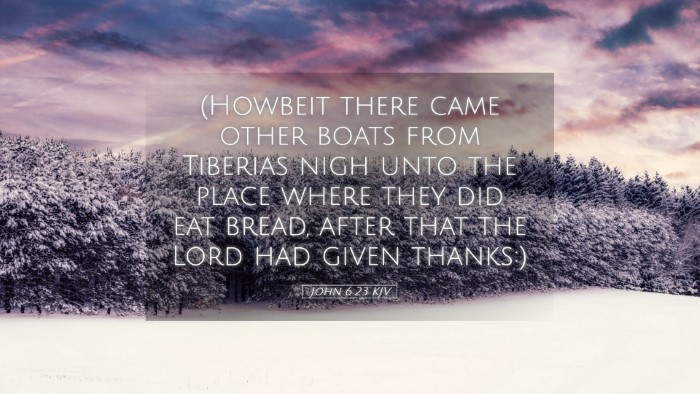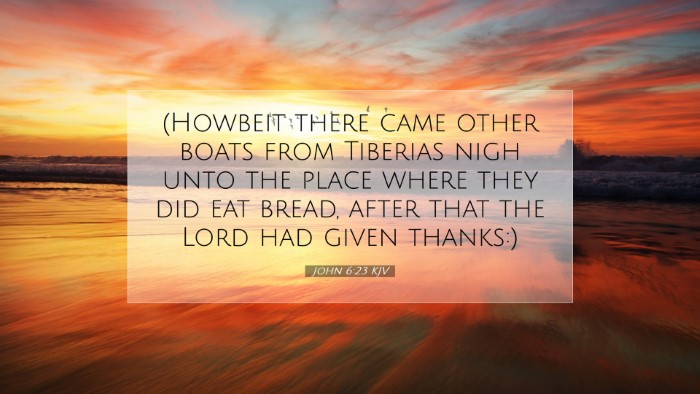Bible Commentary on John 6:23
Verse Text: "Howbeit there came other boats from Tiberias nigh unto the place where they did eat bread, after that the Lord had given thanks."
Introduction
The verse John 6:23 serves as a transitional point in the narrative of John's Gospel, indicating the movement of people seeking Jesus after the miraculous feeding of the 5,000. It underscores the significance of the miracle and sets the stage for deeper theological revelations that follow in Jesus' discourse on the Bread of Life.
Historical Context
Matthew Henry, in his extensive commentary, highlights the setting around the Sea of Galilee, where this event took place. It was not uncommon for boats to travel from Tiberias to Capernaum, suggesting a vibrant trade and fishing economy. This geographical reference anchors the miraculous feeding of the multitudes in a real-world context, emphasizing the interest and movement of the people toward Jesus after witnessing His acts of power.
Analysis of the Boats from Tiberias
Albert Barnes comments on the arrival of the boats from Tiberias, noting that these vessels symbolize the human effort and desire to seek Jesus. They are not just a means of transport but represent a search for sustenance—both physical and spiritual. The people sought after Christ desperately, motivated by both the miracle and their unmet needs.
Spiritual Implications
The presence of the boats thus reflects a deeper spiritual truth: everyone is instinctively searching for something beyond mere physical bread. Just as the people pursued Jesus for more bread, humanity today seeks a solution to its spiritual hunger. This act of seeking foreshadows the deeper discourses on spiritual nourishment that unfold in the subsequent verses.
“Where They Did Eat Bread”
Adam Clarke further explores the phrase “where they did eat bread”, interpreting it as a focal point for the people's memory and experience of Jesus. The act of eating bread in this context is not merely physical nourishment but a reminder of the miraculous provision of God. Clarke emphasizes that the bread signifies life and sustenance that only Jesus can provide.
Theological Insights
This verse also poses profound theological implications regarding the nature of Christ's ministry. Matthew Henry elaborates that Jesus, as the eternal Bread of Life, offers a sustenance that surpasses earthly provisions. The fact that the people are searching for Him indicates a hunger within humanity for a relationship with the divine, which is fully satisfied only in Christ.
- Physical vs. Spiritual Bread: The contrast between physical bread and spiritual bread highlights human dependence on God for all needs.
- Invitation to Seek: The arrival of the boats serves as an invitation for readers to examine their own hearts and their motivations in seeking Jesus.
- God’s Provision: There is a thematic continuity regarding God’s provision, illustrating how earthly blessings can lead to a greater understanding of spiritual necessities.
Conclusion
In conclusion, John 6:23 is a verse replete with layers of meaning and rich for reflection. The movement of the people to seek Jesus after witnessing His miraculous provision points to a universal longing for sustenance that transcends the physical realm. Through the insights gained from public domain commentaries, we grasp not only the historical and geographical significance of this passage but also its profound spiritual implications for all who seek Christ. Understanding this verse invites pastors, theologians, and laypeople alike to pursue a deeper relationship with Jesus as the true Bread of Life.


